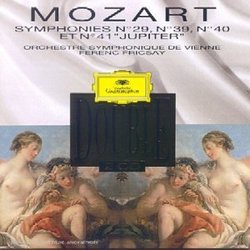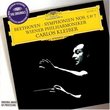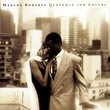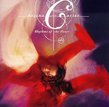| All Artists: Mozart, Fricsay, Vdo Title: Mozart: Symphonies Nos. 29, 39-41 Members Wishing: 0 Total Copies: 1 Label: Polygram Records Release Date: 2/14/1995 Genre: Classical Styles: Historical Periods, Classical (c.1770-1830), Symphonies Number of Discs: 2 SwapaCD Credits: 2 UPC: 028943738620 |
Search - Mozart, Fricsay, Vdo :: Mozart: Symphonies Nos. 29, 39-41
 | Mozart, Fricsay, Vdo Mozart: Symphonies Nos. 29, 39-41 Genre: Classical
Hungarian conductor Ferenc Fricsay's Mozart recordings, especially the operas, were among the glories of the DG catalog in the 1950s and '60s. It was in fact this conductor, and later Karl Böhm--not flashier names lik... more » ![header=[] body=[This CD is available to be requested as disc only.]](/images/attributes/disc.png?v=15401716) ![header=[] body=[This CD is available to be requested with the disc and back insert.]](/images/attributes/disc_back.png?v=15401716) ![header=[] body=[This CD is available to be requested with the disc and front insert.]](/images/attributes/disc_front.png?v=15401716) ![header=[] body=[This CD is available to be requested with the disc, front and back inserts.]](/images/attributes/disc_front_back.png?v=15401716) |
Larger Image |
CD DetailsSynopsis
Amazon.com Hungarian conductor Ferenc Fricsay's Mozart recordings, especially the operas, were among the glories of the DG catalog in the 1950s and '60s. It was in fact this conductor, and later Karl Böhm--not flashier names like Karajan and Bernstein--that carried Mozart's banner forward on disc for something like three decades. These performances are relaxed and genial, and full of the easy grace that seems to have vanished from today's Mozart, particularly those performances on so-called "authentic" instruments. A fine souvenir of a true Mozartean. --David Hurwitz Similarly Requested CDs
|
CD ReviewsWhy so little notice of these recordings? Claudio Freire de C.Barros | RIO BRANCO, ACRE Brazil | 08/01/2001 (5 out of 5 stars) "I have many recordings of these last three Mozart symphonies and,like everybody I,love the recordings of Karl Bohm with the Berliner Philharmoniker released by Deutsche Grammophon.What I find surprising is the aparent lack of interest concerning the recordings by Ferenc Fricsay with the Vienna Symphony Orchestra,recorded at about roughly the same date as the Karl Bohm recordings and released by the same label. While the Karl Bohm recordings are more impressive,the Ferenc Fricsay recordings have a lightness and graciousness which I can only describe as truly Vienesse. Besides the last three symphonies there is also a recording of the Symphony No.29 in A major which is,without any exaggeration,truly wonderful." A welcome dose of Fricsay's vigorous, muscular Mozart Santa Fe Listener | Santa Fe, NM USA | 02/08/2009 (4 out of 5 stars) "One thing a review can do is make the prospective CD buyer aware of fairly objective facts. The previous reviewer speaks of Viennese lightness and grace in these four Mozart symphonies (no. 29, 39, 40, 41) recorded by Ferenc Fricsay in 1960-61. But in fact they are potent, musuclar, at times almost tough performances -- not kin to the qualities we think of as Viennese. Fricsay deliberately set out to restore the masculine side of Mozart, so to speak. For a more feminine approach, one that emphasizes grace, lyricism, and suppleness, I think Bruno Walter would be a good model in his late stereo recordings with the Columbia Sym. on Sony.
As long as we're being somewhat objective, DG didn't remaster these dated analog recordings, and in this bargain two-fer, the sonics tend to be rather rough and grainy, with noticeable mirophone overload and congestion in the loudest passages. And the Vienna Sym., though they play with alertness under Fricsay's bracing leadership, aren't a first-rate orchestra -- so don't expect the Vienna Phil.'s lush, sauve execution. I don't mean for this whole review to sound like a corrective. I admire Fricsay's heartfelt interpretations, which at this late date sound almost like Furtwangler and Klemperer (e.g., in the weighty deliberateness of the opening of Sym. 40). Much of the time tempos and pacing aren't as streamlined as Karajan's (a surprise), and Fricsay is more personal than the efficient Karl Bohm. The Sixties were still a time when Mozart could be fitted into the mold of early Beethoven, as happens here. Tastes have changed dramatically, but I think there's room to enjoy Fricsay's large-scaled, romantic style for its expressive riches." |

 Track Listings (8) - Disc #1
Track Listings (8) - Disc #1








